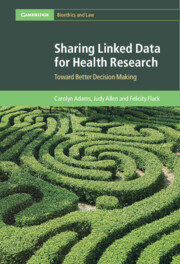Book contents
- Sharing Linked Data for Health Research
- Cambridge Bioethics and Law
- Sharing Linked Data for Health Research
- Copyright page
- Epigraph
- Contents
- Figures
- Tables
- Foreword
- Acknowledgements
- Abbreviations
- Introduction
- Part I Context for Decision Making
- 1 Research Using Linked Data
- 2 Individual, Collective, and Public Interests
- 3 Social Licence
- Part II Frameworks for Decision Making
- Part III Practice and Process of Decision Making
- Glossary
- Index
- Cambridge Bioethics and Law
3 - Social Licence
from Part I - Context for Decision Making
Published online by Cambridge University Press: 02 June 2022
- Sharing Linked Data for Health Research
- Cambridge Bioethics and Law
- Sharing Linked Data for Health Research
- Copyright page
- Epigraph
- Contents
- Figures
- Tables
- Foreword
- Acknowledgements
- Abbreviations
- Introduction
- Part I Context for Decision Making
- 1 Research Using Linked Data
- 2 Individual, Collective, and Public Interests
- 3 Social Licence
- Part II Frameworks for Decision Making
- Part III Practice and Process of Decision Making
- Glossary
- Index
- Cambridge Bioethics and Law
Summary
The concept of social licence is increasingly being used to draw attention to the need for community support and acceptance of research, particularly of data-based research. Chapter three examines the nature of social licence and its application to research using linked data. Social licence is framed as an analytical tool to design and evaluate decision making for sharing and using linked data for research. The chapter examines the qualitative evidence of public perceptions and the conditions for community support and identifies the substantive and procedural conditions that lead to trust and legitmacy. The chapter concludes that these conditions should be embedded in the governance of research using linked data to develop and sustain community acceptance.
- Type
- Chapter
- Information
- Sharing Linked Data for Health ResearchToward Better Decision Making, pp. 57 - 82Publisher: Cambridge University PressPrint publication year: 2022

